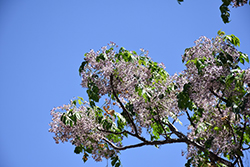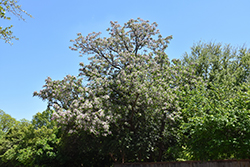It's all about ...
plants

Height: 30 feet
Spread: 30 feet
Sunlight:
![]()
![]()
Hardiness Zone: 7b
Other Names: Texas Umbrella Tree, Bead Tree, Pride of India
Description:
This stunning ornamental tree presents deep green compound glossy leaves; tiny orchid like flowers in spring, followed by bead-like pale yellow fruits; impressive fall color; considered invasive in some areas, fruit is toxic to mammals
Ornamental Features
Chinaberry Tree features dainty panicles of fragrant lilac purple orchid-like flowers with deep purple throats at the ends of the branches in mid spring. It has forest green deciduous foliage. The pointy compound leaves turn an outstanding yellow in the fall. The fruits are showy yellow drupes displayed in mid summer. The smooth plum purple bark adds an interesting dimension to the landscape.
Landscape Attributes
Chinaberry Tree is a multi-stemmed deciduous tree with a shapely oval form. Its average texture blends into the landscape, but can be balanced by one or two finer or coarser trees or shrubs for an effective composition.
This is a relatively low maintenance tree, and should only be pruned after flowering to avoid removing any of the current season's flowers. It is a good choice for attracting birds to your yard, but is not particularly attractive to deer who tend to leave it alone in favor of tastier treats. Gardeners should be aware of the following characteristic(s) that may warrant special consideration;
- Invasive
Chinaberry Tree is recommended for the following landscape applications;
- Accent
- Shade
Planting & Growing
Chinaberry Tree will grow to be about 30 feet tall at maturity, with a spread of 30 feet. It has a low canopy with a typical clearance of 4 feet from the ground, and is suitable for planting under power lines. It grows at a medium rate, and under ideal conditions can be expected to live for 60 years or more.
This tree does best in full sun to partial shade. It prefers to grow in average to moist conditions, and shouldn't be allowed to dry out. It is not particular as to soil type or pH, and is able to handle environmental salt. It is somewhat tolerant of urban pollution. This species is not originally from North America, and parts of it are known to be toxic to humans and animals, so care should be exercised in planting it around children and pets.
This plant is not reliably hardy in our region, and certain restrictions may apply; contact the store for more information.

